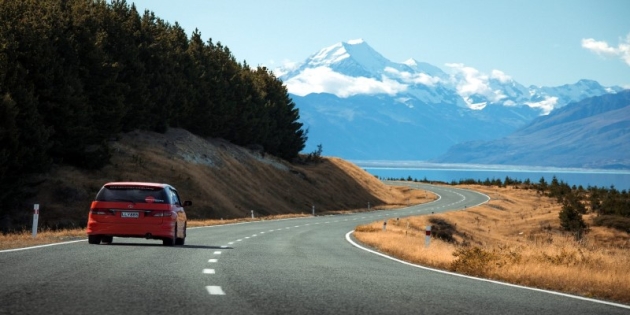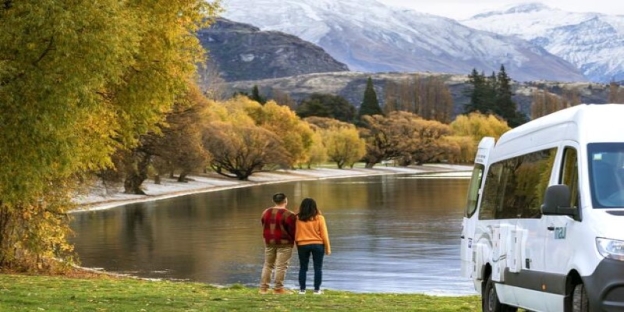Finance
How Comprehensive Employee Benefits Drive Workplace Excellence
1758253175000
Thinking about a New Zealand road trip and wondering where to start? It's not just a scenic drive—it's a complete travel experience filled with wild landscapes, quiet towns, and plenty of room for detours.
Thinking about a New Zealand road trip and wondering where to start? It's not just a scenic drive—it's a complete travel experience filled with wild landscapes, quiet towns, and plenty of room for detours.
New Zealand is built for road trips. The main highlights aren't just cities but everything in between—coastal bends, mountain passes, lakes that change colour with the sky. Driving gives you time to enjoy the journey, not just the destination.

Public transport here doesn't take you to remote hiking spots or scenic lookouts. Tour buses often follow rigid schedules. But with your wheels, you're free to stop at unexpected waterfalls, pull over for a photo when the light hits just right, or take a gravel road that leads to a hidden beach.
The roads are well-maintained, and the distances aren't overwhelming. Even the long stretches rarely feel dull. If anything, the view makes the time pass faster.
The usual entry points are Auckland in the North Island and Christchurch in the South Island. Which one you choose depends on how much time you have and what you want to see. Many travellers begin in one location and fly out from the other, especially when renting a car or campervan on a one-way basis.
The North Island offers geothermal parks, volcanic landscapes, and rich Māori culture. The South Island delivers alpine ranges, fjords, glaciers, and some of the most scenic drives in the world. If your schedule allows it, covering both islands makes for a well-rounded trip. The ferry between Wellington and Picton is vehicle-friendly and runs several times a day.
New Zealand road trip options vary depending on your vehicle. Campervans are a favourite among many, offering the freedom to stay overnight in nature or pull into holiday parks. They're especially popular with budget travellers and people who enjoy off-grid living. But they're larger to handle and cost more in fuel.
If you prefer comfort, driving a regular rental car and booking motels or Airbnbs is also a good option. It gives you better mileage, easier parking, and access to areas where campervans may be restricted. For off-the-beaten-path routes, such as exploring the remote backcountry or gravel mountain passes, some travellers opt for a 4WD vehicle, but this isn't necessary for the primary tourist circuits.
Booking ahead is essential, especially during the summer months between June and August. Vehicle supply can run low quickly, and rates go up the closer you get to your travel dates.
The perfect route depends on your interests and the amount of time you have. That said, there are a few well-tested options that never disappoint.
If you’re sticking to the North Island, a great loop begins in Auckland and goes through Waitomo, Rotorua, Taupō, and ends in Wellington. This gives you glowworm caves, geysers, mud pools, and lake views all in one trip.
In the South Island, starting in Christchurch and heading to Lake Tekapo, Mount Cook, Queenstown, and then along the West Coast before looping back through Arthur’s Pass offers some of the most breathtaking scenery in the country.
For those who want a complete journey from top to bottom, going from Auckland to Queenstown lets you experience both islands. The landscapes change noticeably the farther south you go, so there's a steady sense of progression in the journey.
The best time for a New Zealand road trip depends on what kind of experience you want. Summer, from December to February, offers long daylight hours and warm temperatures. This is peak travel season, so prices are higher and some areas will be busier.
Spring (September to November) and autumn (March to May) are excellent times if you prefer fewer crowds, cooler air, and a chance to see seasonal colour—either blossoms or golden trees. Winter brings snow to the mountains, making it perfect for travellers interested in skiing, but some alpine passes may close temporarily due to adverse weather conditions.
You’ll want at least ten days for one island and closer to three weeks to do both without feeling rushed. Anything shorter will limit how much you can stop, which is part of the appeal of a road trip in the first place.
Driving in New Zealand isn't difficult, but it's essential to be aware of some local habits and rules. People drive on the left-hand side, and roads outside cities can be narrow and winding. Speed limits are strictly enforced, and some rural stretches may not have fuel stations for hours.

Plan to drive shorter distances than you would at home. A 200-kilometre journey might take over three hours if it includes mountain passes or scenic sections. Allow time for frequent stops—you'll want to take them.
One-lane bridges are standard, especially on the West Coast. Watch for road signs to know when to yield. And don't rely solely on mobile data; signal drops are common in remote regions, so consider downloading offline maps or using a GPS.
The weather in New Zealand can shift quickly. Even in summer, mountain regions can get chilly. Bring layers: a light jacket, breathable shirts, and at least one warm sweater. A good raincoat is non-negotiable. If you're planning on hikes or visiting remote areas, proper walking shoes and a reusable water bottle are thoughtful additions.
You'll also want swimwear. Hot springs, lakes, and coastal bays are scattered throughout the country. Keeping a towel and a change of clothes in the car makes spontaneous stops easier.
You don't need to overdo it with food or gear. Supermarkets are available in most towns, and you can always pick up extra supplies on the way. However, do plan to visit remote areas where services are limited.
It’s not about ticking every tourist stop off a list. It’s about waking up to mountain views, pulling over for sheep crossings, and having the freedom to follow a local’s suggestion or change your plan when the clouds clear over a distant valley.
A well-planned New Zealand road trip strikes a balance between structure and spontaneity. You'll have your route and bookings sorted, but leave room for the unexpected. Some of the best moments won't be in any brochure. They'll be the ones you stumble on by accident.
tech
1756805573000
finance
1757665453000
health
1758180359000
tech
1757491038000



